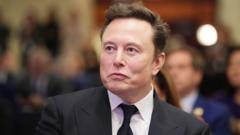Elon Musk, the billionaire entrepreneur, has made headlines once again by distributing $1 million (£770,000) checks to voters in Wisconsin just days before a crucial state Supreme Court election. His philanthropic initiative came under scrutiny when Wisconsin Attorney General Josh Kaul filed a lawsuit attempting to block the giveaway, arguing it contravened a state law prohibiting gifts in exchange for votes. This election is pivotal, as it could swing control of the state’s Supreme Court from Democrats to Republicans, making it one of the most expensive judicial elections in American history.
Musk's decision to hand out the funds, which he announced earlier in the week, was paired with comments made at a Sunday night rally where he emphasized the need for impartial judges. He specifically targeted those he deemed "activist" judges, signifying a push towards conservative judicial principles. Kaul's legal team argued that the checks represented an unlawful attempt to purchase votes. However, Musk’s legal representatives countered that this action was a form of political speech protected under the First Amendment, asserting that the intent was to inspire grassroots opposition to perceived judicial overreach rather than influence specific candidates.
Despite Kaul's pleas for intervention from the state’s Supreme Court, which could have halted Musk's campaign, the court unanimously opted not to take the case. Musk has aligned himself with conservative judicial candidate Brad Schimel, who is contesting against Susan Crawford, who has gained support from current liberal justices on the bench. As the election approaches, political experts perceive it as a referendum on the direction of Trump’s influence in the country, especially in key areas like abortion rights and voting regulations that could be pivotal in the 2026 midterms.
In an interesting development, Schimel has recently distanced himself from Musk, expressing uncertainty about the billionaire's actions or rally plans when contacted by media. This isn’t Musk’s first foray into politics through financial incentives; he previously offered $1 million rewards to voters if they supported First and Second Amendment rights, a move that was later deemed lawful by a Pennsylvania judge. As the financial stakes rise in Wisconsin’s Supreme Court race, all eyes remain fixed on the implications for future judicial rulings and the political landscape.
Musk's decision to hand out the funds, which he announced earlier in the week, was paired with comments made at a Sunday night rally where he emphasized the need for impartial judges. He specifically targeted those he deemed "activist" judges, signifying a push towards conservative judicial principles. Kaul's legal team argued that the checks represented an unlawful attempt to purchase votes. However, Musk’s legal representatives countered that this action was a form of political speech protected under the First Amendment, asserting that the intent was to inspire grassroots opposition to perceived judicial overreach rather than influence specific candidates.
Despite Kaul's pleas for intervention from the state’s Supreme Court, which could have halted Musk's campaign, the court unanimously opted not to take the case. Musk has aligned himself with conservative judicial candidate Brad Schimel, who is contesting against Susan Crawford, who has gained support from current liberal justices on the bench. As the election approaches, political experts perceive it as a referendum on the direction of Trump’s influence in the country, especially in key areas like abortion rights and voting regulations that could be pivotal in the 2026 midterms.
In an interesting development, Schimel has recently distanced himself from Musk, expressing uncertainty about the billionaire's actions or rally plans when contacted by media. This isn’t Musk’s first foray into politics through financial incentives; he previously offered $1 million rewards to voters if they supported First and Second Amendment rights, a move that was later deemed lawful by a Pennsylvania judge. As the financial stakes rise in Wisconsin’s Supreme Court race, all eyes remain fixed on the implications for future judicial rulings and the political landscape.





















